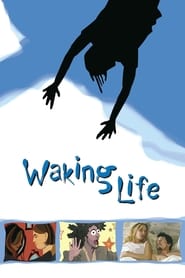The conventional understanding of animated film production involves a multitude of assumptions concerning shot selection and what gets included in the frame at any given time. A certain film grammar exists in animated films, therefore, which is subtly transformed when regular live action is directly transposed into the animated realm via motion capture. The net result of this is an uncanny, familiar-but-not-recognisable effect for the viewer.
In Waking Life, I'm thinking in particular of the cutaways to random details that would never be animated in the traditional sense — in part due to the established grammar of animation, but also due to the simple labour of needing to hand-draw things begin with. The perceived redundancy of effort behind these brief visual asides reads as pleasurably indulgent to me; moments of surplus detail that are distant relative to the cutaways of nature that we can see in films by Yasujirō Ozu or Hayao Miyazaki. They also have the effect of drawing attention to the fact that the movie is a piece of deliberate cultural production as well. Far from being 'pointless', the decision to motion-capture Waking Life serves as a kind neo-Brechtian alienation device to jolt the audience into paying attention to the fact that it's a constructed world to begin with and adds another layer to the film's engagement with the ideas of a constructed fictional worlds.
Anyway, I was surprised how much more I enjoyed this a couple of years on, finding it curiously less pretentious rather than more. I barely even cringed at the straight-to-the-audience "Oh yeah, he won an award for that book". Of course, it would be exhausting to live in Linklater's world, where every 'waking' moment would require the exchange of pseudo-profundities, linked together by eye-roll-inducing segues in the form of "as D. H. Lawrence recalled," but that's probably the wrong kind of critique to level at an obviously fictional universe. Anyway, we have Joe Rogan for this kind of philosophy now.
Synopsis: Waking Life is about a young man in a persistent lucid dream-like state. The film follows its protagonist as he initially observes and later participates in philosophical discussions that weave together issues like reality, free will, our relationships with others, and the meaning of life.

